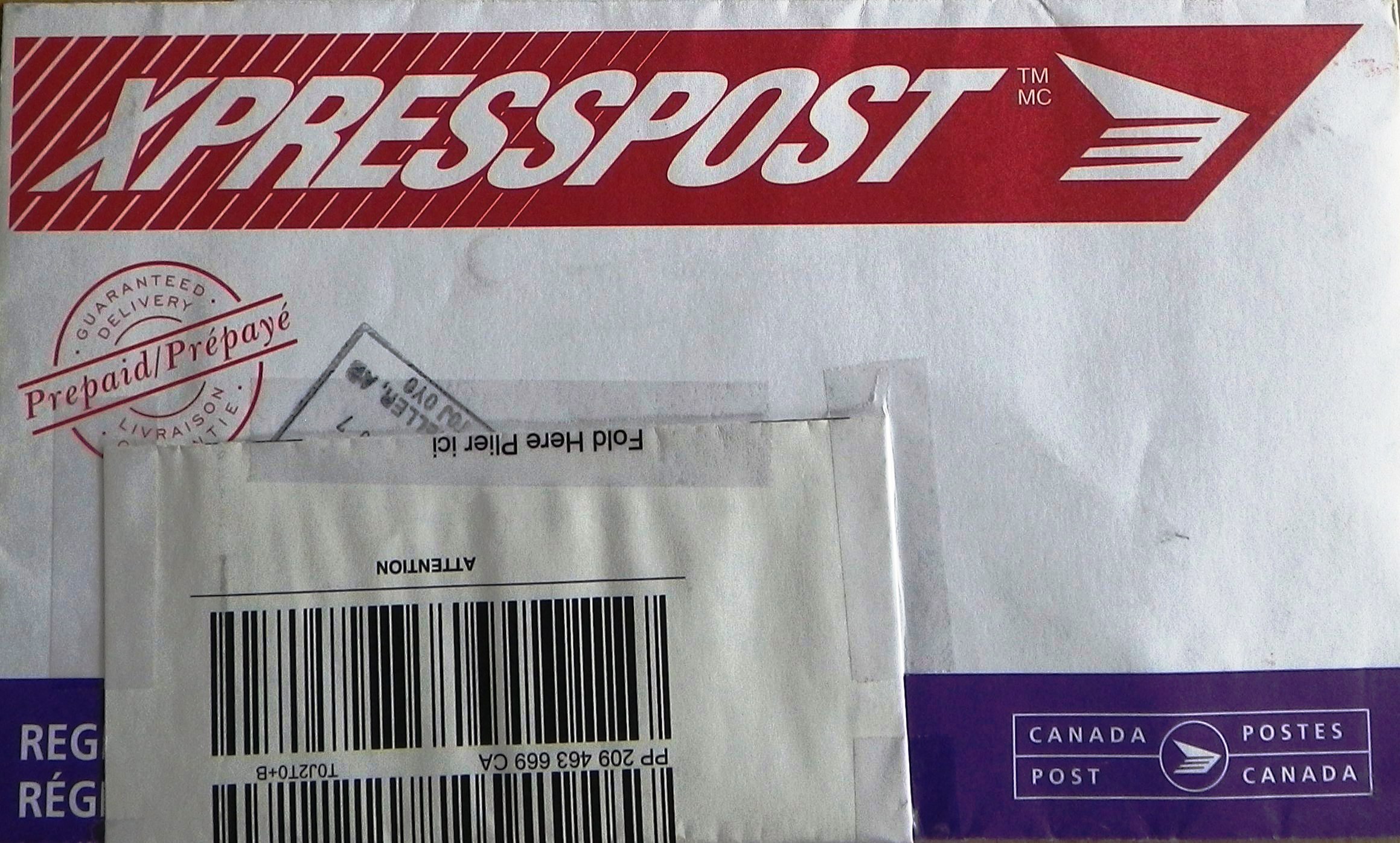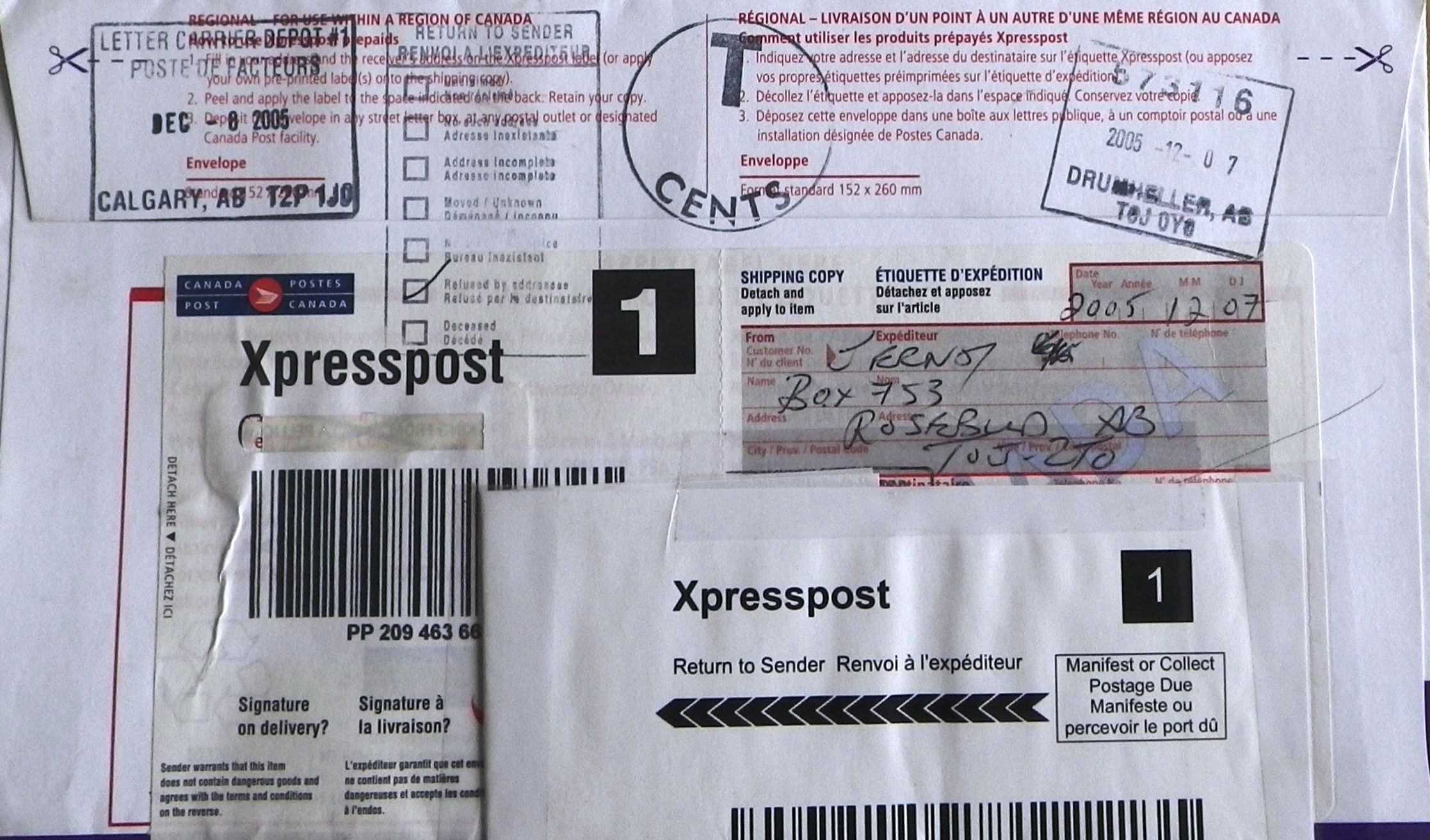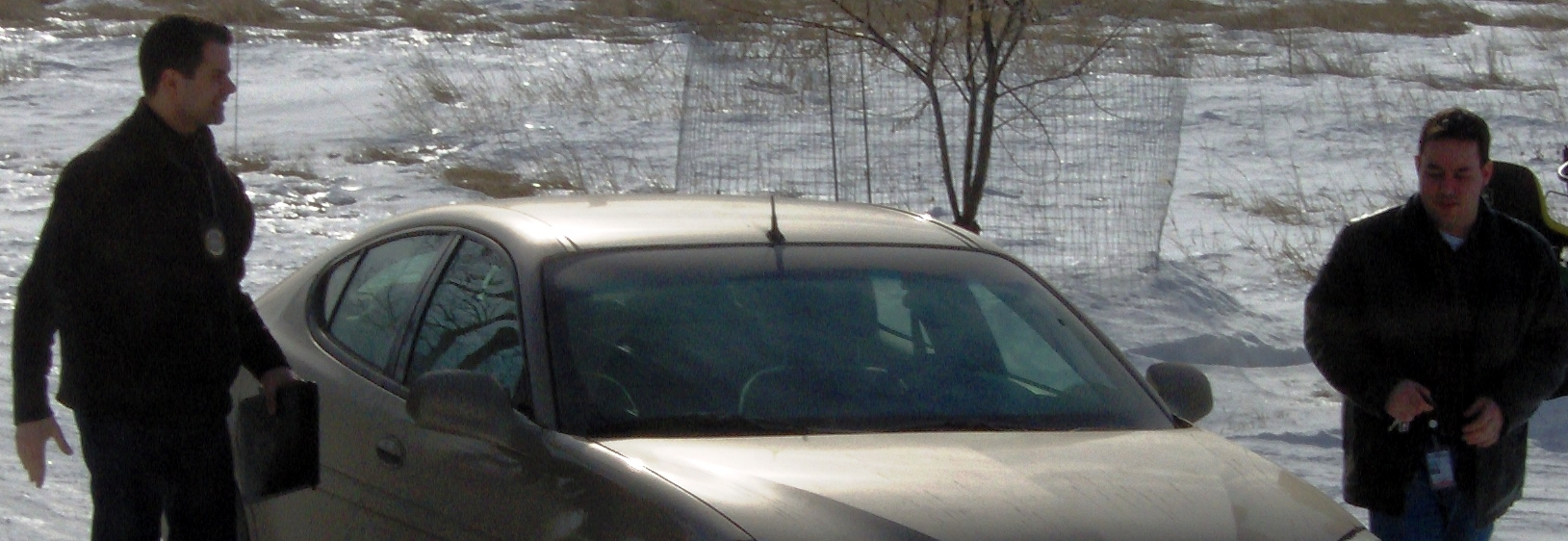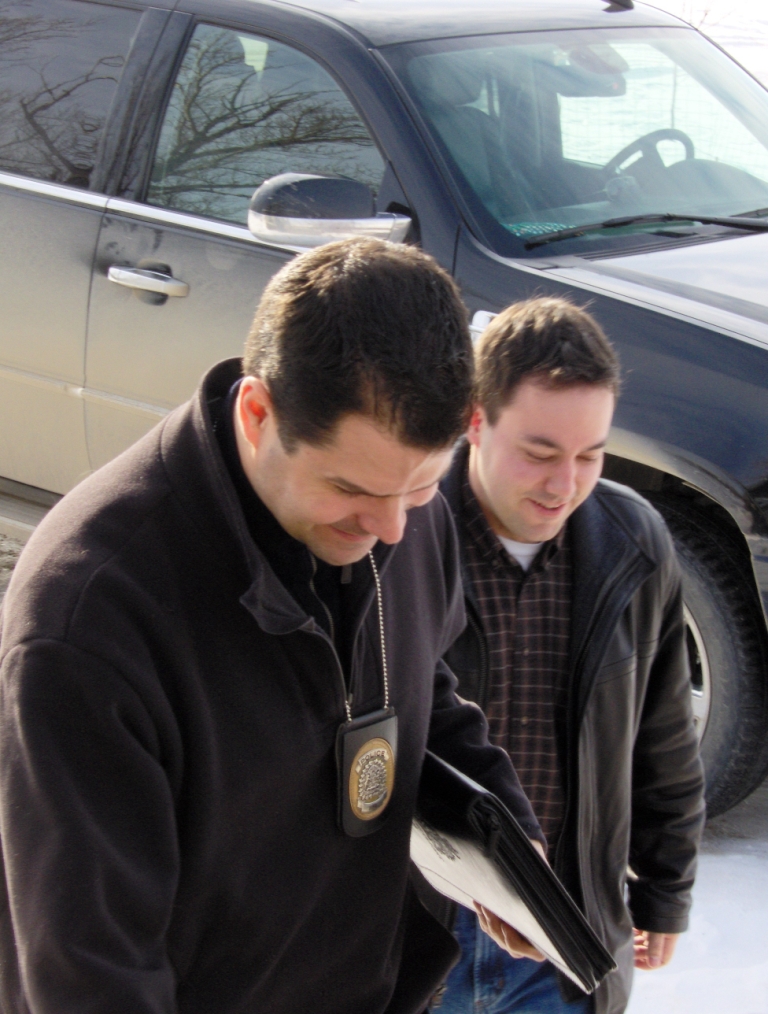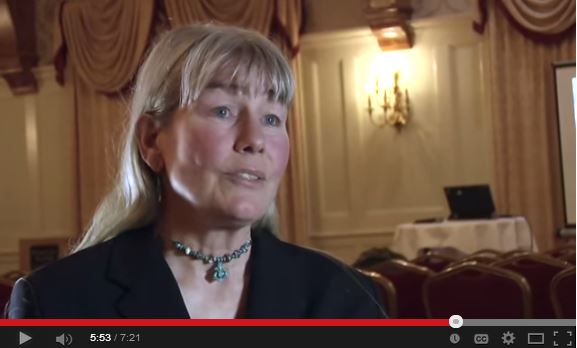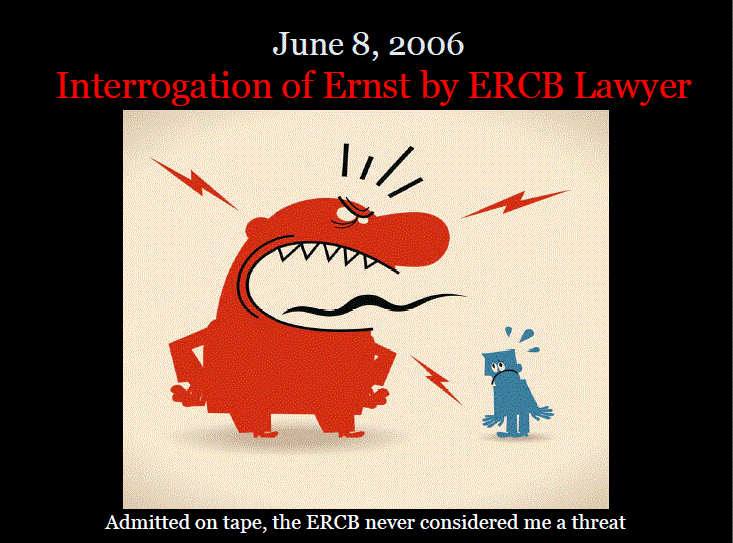Ian asks if Ernst still has the returned (2005) letter and envelop she sent the regulator requesting clarification on it banishing her (November 24, 2005) and judging her making criminal threats without a hearing or trial.
The evidence remains in Ernst’s files, sealed in the rejected envelop stamped by Canada Post (photographed May 9, 2014). It will remain sealed until entered into evidence, if the Charter violation is ever allowed to go to trial:
Ernst’s December 6, 2005 letter to EUB Operations Group Manager Mr. Jim Reid was sent XPRESSPOST, requiring signature on delivery. The unopened letter, stamped by Canada Post “Refused by addressee,” arrived back in Ernst’s mailbox the day her contaminated water made Front Page of the Edmonton Journal.
“Refused by addressee” is checked off.
The AER (then EUB) refused Ernst’s 2005 letter to EUB manager Jim Reid requesting clarification on the regulator judging her making criminal threats without a hearing or trial. Ernst’s questions to Chair (Neil McCrank) about her banishment were also ignored:
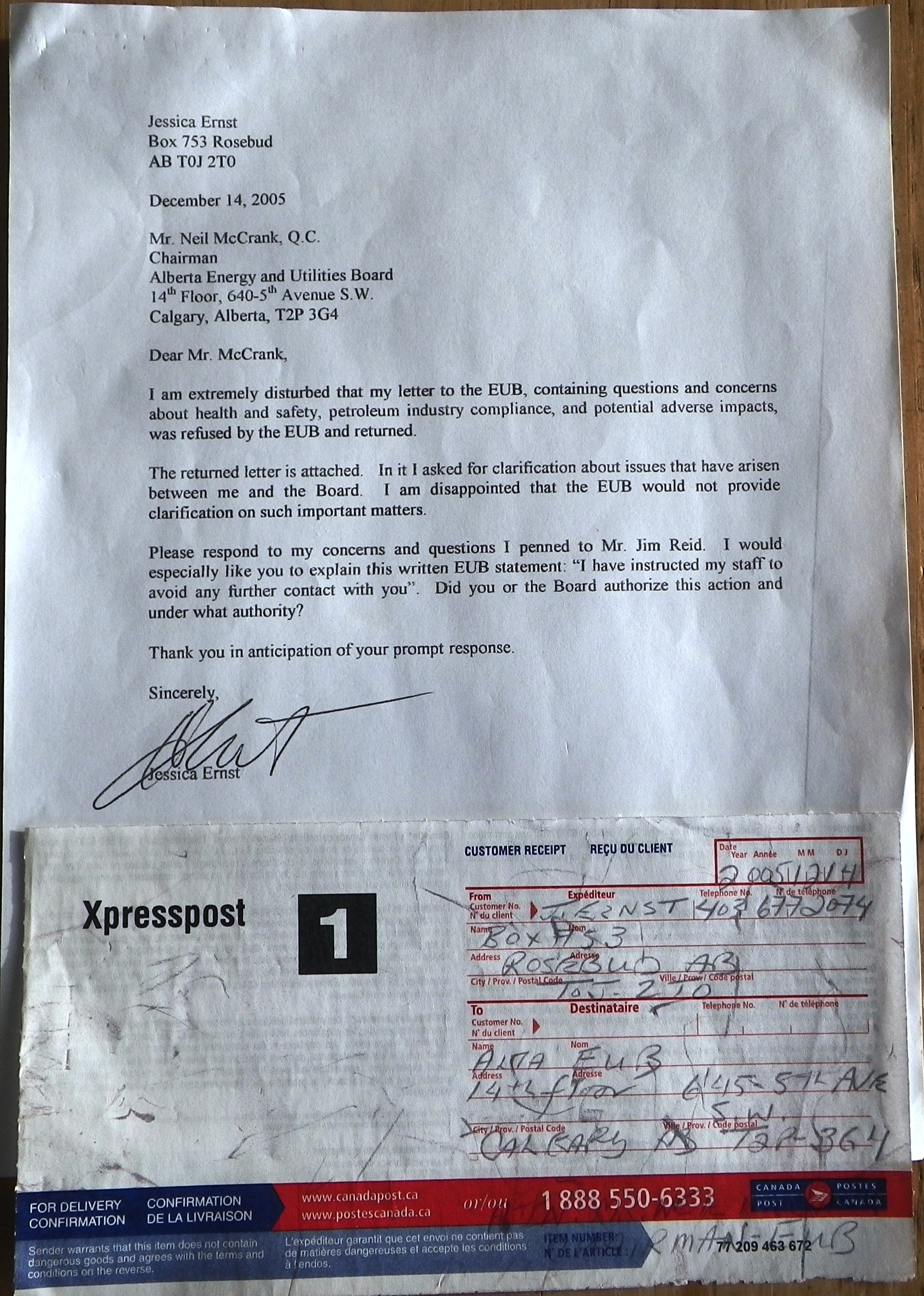
Eight years later, after the regulator’s lawyer (Glenn Solomon) lied about Ernst in a court filing calling her a terrorist without evidence and claiming terrorists’ charter rights need not be protected, Justice Neil Wittmann ruled there was no evidence of Ernst being a terrorist:
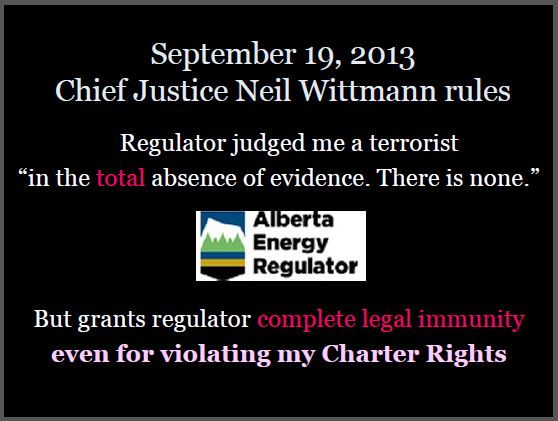
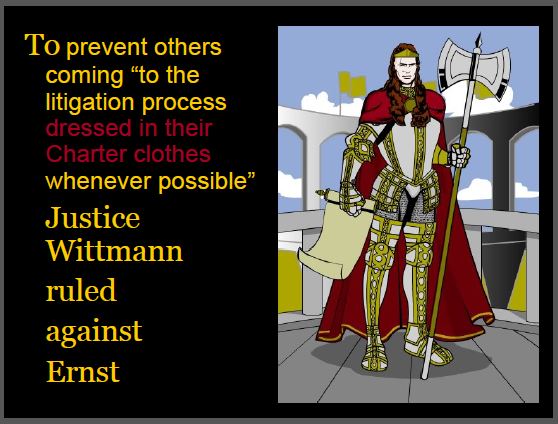
The police never fingerprinted, charged or arrested Ernst.
More than three years after the EUB judged (without any evidence) Ernst making criminal threats and two months after Ernst’s legal papers were served on the defendants, members of Harper’s anti-terrorist squad harassed her and trespassed on her private property to intimidate (scare Ernst to drop her lawsuit?):
February 12, 2009: The Intimidation of Ernst A segment of Ernst presentation at Cochrane, Alberta, September 10, 2011
February 12, 2009: Following a CTV W5 National News segment of Ernst’s explosively contaminated well water and the ERCB’s (now AER, previously EUB) treatment of her, “undercover” Royal Canadian Mounted Police with Harper’s anti-terrorist squad arrive warrant-less at Jessica’s home in Rosebud.
More information:
Plaintiff rejects energy board’s ‘ecoterrorist’ accusation
In addition the board argues that its governing statutes provide immunity not only “for negligence but gross negligence, bad faith and even deliberate acts.”
“If indeed the legislature wishes to grant such sweeping and total immunity to a government agency that has such an important role in the lives of rural Albertans, it must do so specifically and with clear wording,” replies an Ernst legal brief. “It has not. The legislature has failed to include omissions.”
The ERCB legal defense brief also portrays Ernst as an “ecoterrorist” and says it ceased all communication with her out of concern of violence in [2005] after Ernst made an offhand comment about “the Wiebo Way.”
Wiebo Ludwig was a northern Alberta landowner who orchestrated a unprecedented campaign of industrial sabotage against the oil and gas industry in the late 1990s after five years of civil complaints and little regulatory response. Since then hundreds of landowners in Alberta and British Columbia have made comments about “the Wiebo Way.”
A legal brief submitted by Ernst’s lawyers argue that the ERCB’s allegations are not supported by public evidence and amount to character assassination.
A transcript of a taped conversation with an ERCB lawyer read and heard by this reporter seems to contradict the contents of this ERCB brief. In 2006 a board lawyer admitted to Ernst and a witness that the agency had no real safety concerns with Ernst, but disliked her public criticism of the board because it had become “humiliating.”
“The ERCB takes the prejudicial, vexatious, unsupported and wholly unsupportable position that the ‘expression’ the Plaintiff seeks to protect was a ‘threat of violence’ and that the ERCB ceased communication with Ms. Ernst ‘in order to protect its staff, the Alberta public and the Alberta oil and gas industry from further acts of eco-terrorism.’This is a prejudicial and irresponsible accusation that is entirely without foundation.”
Adds the brief: “If the ERCB wishes to advance its patently absurd and irresponsible theory that Ms. Ernst’s offhand reference to Wiebo Ludwig was somehow a ‘threat of violence,’ and that an appropriate response to ‘protect against further acts of eco-terrorism’ was to cease communication with the Plaintiff, it must do so by forwarding cogent evidence. The ERCB has not, and frankly cannot, put forward such evidence.”
2013: Ernst interview in Co Clare, Republic of Ireland before presenting:
For more information on the leave to appeal to the Supreme Court:
2007: Others harmed by the AER:
Many landowners complain they have been let down by the process and have lost faith in the board to protect them and their land. Paula Hopwood, a 38-year-old mother of three who lives near Drayton Valley, is still seething from her dealings with the board when she tried to prevent a gas well from being drilled upwind from her farmhouse. She was concerned a well close to the house could kill her severely asthmatic six-year-old son. She tried to have the well drilled downwind so the prevailing winds would carry the odour away. When she met with board employees and the company to try to resolve the issue, she claims the EUB official advised her that he “had asthma as a kid and asthma doesn’t kill children.” At that point she threw him out of her house.
She thought she would get better treatment at a hearing, but she stormed out in tears when company officials questioned her motives and suggested she shouldn’t be living in the oilpatch with an asthmatic child. Hopwood said it would have cost the company $10,000 to drill the well from the location she suggested. The board compromised and allowed the company to drill upwind, but farther away. That decision killed all faith Hopwood had in the board. She said she no longer trusts it to look out for the health and safety of Albertans. “Anyone who has had to deal with them realizes the EUB does not protect you,” she said. “The people who are hearing your case are judge and jury and they are being paid by the company you are going up against.” (The majority of the board’s annual budget is funded through an industry levy.) “The EUB seems to be the wingman for the oil companies.” [Emphasis added]

